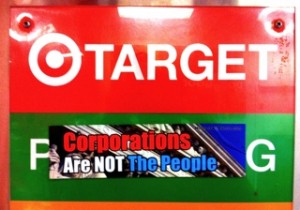by John Wellington Ennis
The Huffington Post
Odds are if you have been around Los Angeles, you have seen his work. Among the entertainment capital’s omnipresent billboards and bus ads for the latest studio mush, little deposits of his artwork spring out of the urban marketplace like willful foliage to wink at you on your commute. Some call it vandalism, some are incapable of even seeing it, and some will pay hundreds for an original.
Digable Planets ‘ emcee Butterfly once declared, “The city’s a museum with its posters and graffiti.” While the urban gallery of Los Angeles exhibits colorful murals and tagging scrawled in the city’s margins, there is a subculture that lurks in the dead of night to adorn utility boxes, street signs, dumpsters, and unclaimed walls with paint, posters and paste, in the pursuit of what is simply known as “street art.”
Less than a year ago, the recognizable Monopoly Man figure began appearing around town plastered against traffic light boxes, lampposts, and building tops. The tuxedoed icon would be recognizable with his pocket watch and top hat, but now he was spinning turntables, or needing healthcare. In an era of billion dollar bailouts for banks that already own the country and moguls decrying regulation as un-American, the re-contextualization of the childhood symbol of success and wealth almost needed no explanation. [Read more]
By T.W. Farnam
Washington Post
Sunday, August 22, 2010; A05
The Supreme Court’s decision this year in Citizens United, which lifted campaign spending restrictions for companies and interest groups, has indirectly thrust the Internal Revenue Service into the more prominent role of overseeing those expenditures.
The ruling largely tied the hands of the Federal Election Commission to force companies or groups that are funding political or advocacy advertisements to disclose their donors. And although Democrats in Congress had pushed legislation that would have mandated more disclosure, the measure failed in the Senate this summer.
Long-standing IRS regulations require some groups to reveal their donors, and that is why the agency suddenly finds itself with what some might see as a more crucial watchdog role, stepping in to monitor disclosure in the absence of the FEC. But the IRS rules also have long-standing loopholes and, with limited resources and enforcement tools, the nation’s tax collector is not set up to be a campaign regulator.
“The chances of the IRS being able to catch a violation of the tax law around campaigns is virtually nil,” said Marcus S. Owens, a lawyer with Caplin & Drysdale who directed the agency’s tax-exempt organizations division for 10 years. “Certainly if it happens, it’s going to be well after the election has already ended.”
[Read more]
In his weekly address, President Obama was unusually detailed in his critique of the Citizens United decision, the GOP’s clear support of the corporate money/influence it brings, and his administration’s efforts to maintain a fair and open modern America democracy as President Teddy Roosevelt.
By MARTIGA LOHN | 08/20/10 05:11 AM | ![]()
MINNEAPOLIS — A few Target Corp. and Best Buy Co. institutional shareholders weighed in Thursday on the flap over the companies’ political donations in Minnesota, urging the boards of both retailers to increase their oversight of campaign contributions.
Walden Asset Management and Trillium Asset Management Corp., both of Boston, and Bethesda, Md.-based Calvert Asset Management Co. filed shareholder resolutions with both companies. Together, the three firms control less than 1 percent of each company’s outstanding shares — 1.1 million Target shares worth $57.5 million and 344,000 Best Buy shares worth $11.3 million — but they are moving the debate over the political giving to a new arena.
 Target gave $150,000 and Best Buy $100,000 to a business-focused political fund helping a conservative Republican gubernatorial candidate in Minnesota, triggering a national backlash from gay rights groups and liberals. The companies made the donations after a recent U.S. Supreme Court ruling freed them to spend corporate funds on elections. The candidate, state legislator Tom Emmer, opposes gay marriage and other rights for same-sex couples.
Target gave $150,000 and Best Buy $100,000 to a business-focused political fund helping a conservative Republican gubernatorial candidate in Minnesota, triggering a national backlash from gay rights groups and liberals. The companies made the donations after a recent U.S. Supreme Court ruling freed them to spend corporate funds on elections. The candidate, state legislator Tom Emmer, opposes gay marriage and other rights for same-sex couples.
“A good corporate political contribution policy should prevent the kind of debacle Target and Best Buy walked into,” said Trillium vice president Shelley Alpern. “We expect companies to evaluate candidates based upon the range of their positions – not simply one area – and assess whether they are in alignment with their core values. But these companies’ policies are clearly lacking that.”
[Read more]
Part demonstration, part flash mob, all musical theater, The Other 98% invaded a Target store to protest the retail giant’s recent donations to political candidates. The Target Boycott called by MoveOn just went up a notch or two.
By Tom Hamburger
Driven by increasing anger at Democratic policies and by recent Supreme Court decisions unshackling corporate contributions, business and conservative groups are preparing a flood of campaign money to try to wrest control of Congress from the Democrats.
The U.S. Chamber of Commerce, the biggest collection point for corporate contributions, has increased its spending for the congressional election in November from $35 million in 2008 to a projected $75 million this year. Officials say it may go even higher.
The chamber has been joined by new conservative fundraising organizations — such as American Crossroads, affiliated with Republican strategist Karl Rove — that have committed to raising tens of millions of dollars.
[Read more]